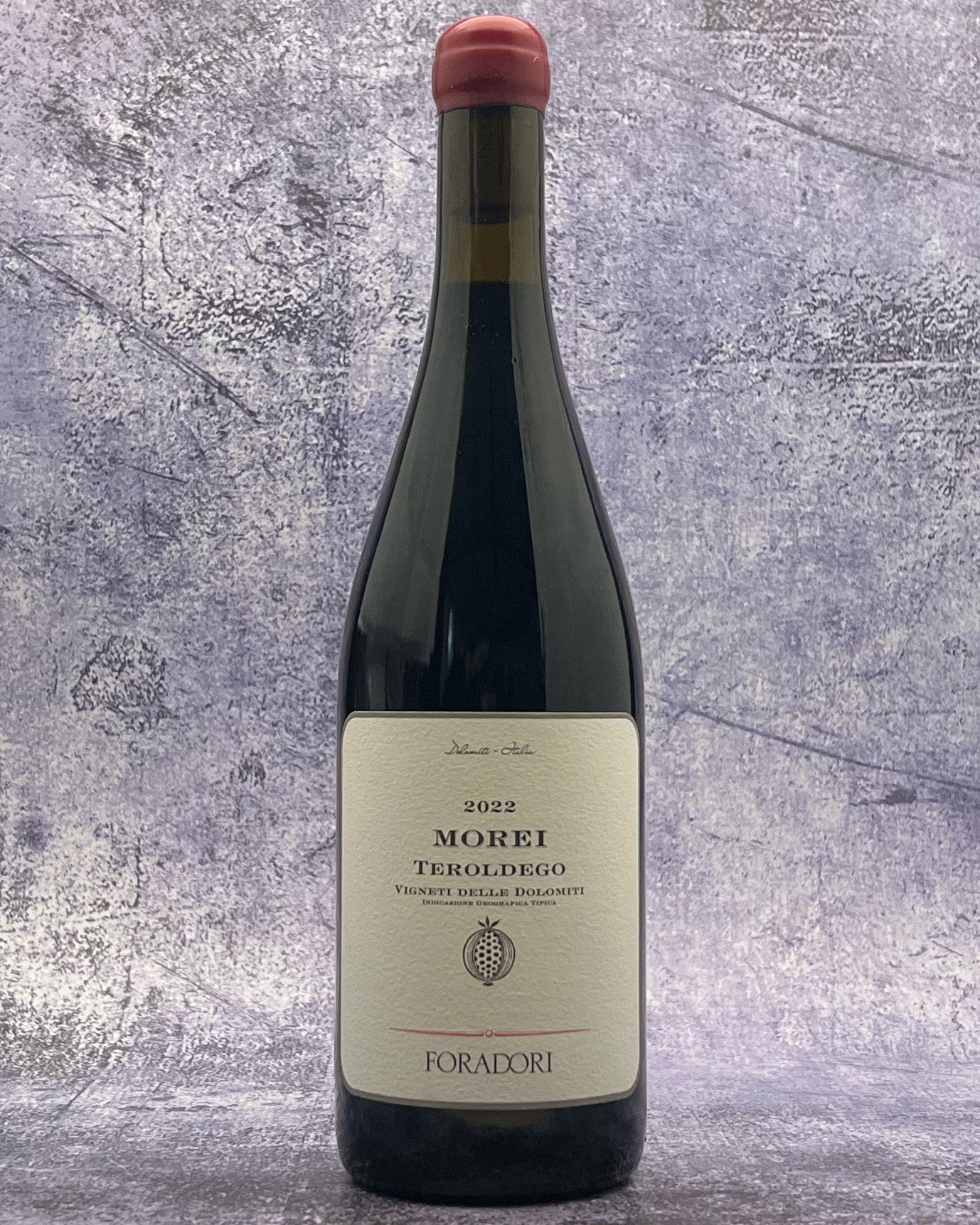Description
From: Campo Rotaliano, Trentino, Alto Adige, Italy
Varietal: Teroldego
Critical Acclaim: Purplish in the glass. Lively fruit on the nose, with bright raspberry and blackcurrant aromas wrapped up in aromatic herbs. The palate shows crisp, integrated acidity and lightly framed tannins. Delicious and so fresh. From organically and biodynamically grown grapes with Demeter certification. 95 points James Suckling
A beguiling blend of black raspberries, exotic spice, leather straps, cocoa and crushed stones makes the 2022 Teroldego Morei impossible to ignore. This is juicy and fresh in style with lifted textures, crisp wild berry fruits and zesty acidity that keeps the energy remarkably high. Tactile mineral tones add a pleasant crunch as hints of white pepper and pomegranate linger over a bed of gently grippy tannins. The 2022 Morei has a more immediate feel than past vintages, yet its balance can not be denied. The purity alone is spellbinding. 92 points Vinous
There's an accessible feel to this open-knit, medium- to full-bodied red, showing good integration of the racy acidity and sinewy tannins with flavors of pureed blackberry, dried mint and black tea leaf, singed orange peel and milled white pepper. Enjoy this today or with short-term cellaring. Drink now through 2029. 850 cases made, 125 cases imported. 91 points Wine Spectator
Pairing: For traditional pairings, consider dishes like Spezzatino di Manzo (Italian beef stew), where the wine’s acidity cuts through the richness of slow-cooked beef, or Canederli (bread dumplings), a northern Italian specialty served with a mushroom or butter sauce. The wine’s lively fruit and spice notes also make it an excellent match for Polenta con Salsiccia (polenta with sausage), as its freshness balances the savory depth of the dish.
This shines with grilled lamb chops, pork loin, or beef roast seasoned with rosemary and garlic for a more contemporary pairing, allowing the tannins and bright fruit to complement the meat's richness. Its zesty acidity also makes it a great partner for roast duck with a berry glaze or a Moroccan lamb tagine with dried fruits and warm spices, which mirror the wine’s exotic spice and fruit character.
Polenta and Sausages for a Crowd (Polenta Alla Spianatora)
By David Tanis
About. Azienda Agricola Foradori, located in the northern Italian region of Alto Adige, is one of the country's most respected and renowned wineries, with a deep-rooted history in producing indigenous grape varieties, particularly Teroldego. The estate was founded in 1901, but its modern legacy began when Elisabetta Foradori took over in 1984 following her father's passing. At 19 years old, she embarked on a mission to revitalize the family estate, modernize its practices, and elevate its wines, bringing them to international recognition.
Elisabetta is celebrated for her pioneering work with the Teroldego grape, an Indigenous variety that was largely overlooked at the time. She recognized its potential and devoted herself to refining its expression through organic and biodynamic farming, eventually becoming a symbol of this renaissance. Over the years, she has become a prominent voice for biodynamics, leading by example through her commitment to farming with respect for the land, biodiversity, and long-term sustainability.
A significant milestone came in the early 2000s when the Foradori estate officially converted to biodynamic farming. This transition was more than a change in agricultural techniques; it was a philosophical shift toward creating wines deeply connected to their terroir, which expresses the land's natural cycles. Elisabetta's focus on biodiversity, soil health, and minimal intervention in the vineyard and the cellar reflects her dedication to crafting wines with integrity and a sense of place.
The Foradori estate is nestled in the Campo Rotaliano, a small but highly distinctive Trentino area within the broader region of Alto Adige. This area lies at the foothills of the majestic Dolomite Mountains, which provide a stunning backdrop and significantly influence the local climate and terroir. The estate benefits from a alpine-continental environment, where the cool temperatures and the stark diurnal shifts play a crucial role in shaping the character of the wines.
The Campo Rotaliano is a former Noce River riverbed, which has created a unique alluvial plain. The soils here are gravelly, rich in minerals, and well-draining, ideal for grape cultivation. These conditions, particularly the stony, porous soils, encourage profound root growth and vine stress, often leading to wines of higher concentration and complexity. The presence of the Dolomites also acts as a protective barrier, shielding the vineyards from extreme weather conditions while allowing sufficient exposure to sunlight, which is critical for ripening the grapes in this northern wine- growing region.
The influence of the Dolomites extends beyond mere protection; they create a microclimate that ensures cool nights even in the warm summer months, facilitating the slow ripening of grapes and preserving their acidity. This extended growing season is crucial for varieties like Teroldego, allowing the grapes to fully develop their flavor profiles while retaining the freshness and vibrancy that characterize Foradori’s wines. The vineyards' elevation, which sits between 220 to 350 meters above sea level, also contributes to the cool climate, further enhancing the natural acidity and structure of the wines.
The terroir of the Foradori estate is deeply intertwined with its indigenous grape varieties, particularly Teroldego, which thrives in these unique conditions. The cool temperatures and ample sunlight enable the development of bright, focused fruit flavors, while the gravelly soils impart minerality and depth. In addition to Teroldego, the estate also grows other native varieties, such as Nosiola, which benefits from the region’s specific microclimate to express nuanced, mineral-driven flavors. These characteristics are a direct result of the combination of climate, elevation, and soil composition, all of which work harmoniously to create expressive and elegant wines.
In 2012, Elisabetta Foradori passed the reins of the estate to her children, Theo, Myrtha, and Emilio Zierock, who have continued her legacy with the same dedication to biodynamic principles and the production of terroir-driven wines. The family focuses on creating wines with minimal intervention, eschewing chemical additives, and emphasizing natural fermentation. They have also explored amphora aging, which reflects their desire to maintain purity and authenticity in their wines.
The Foradori estate today stands as a beacon of innovation and tradition in Italian winemaking. Its portfolio includes several expressions of Teroldego and distinctive whites like Nosiola and Pinot Grigio. The estate's commitment to organic and biodynamic practices, along with its deep connection to the land and native grape varieties, has earned it a global reputation for quality and authenticity. Elisabetta Foradori's work inspires a new generation of winemakers who seek to honor their local terroir while embracing sustainable practices.
Wine Notes. Morei Teroldego results from years of careful biodynamic farming and a deep understanding of the vineyards' unique characteristics. After observing the distinct qualities of each plot, the Foradori estate realized the need for separate vinification for two of their key Teroldego vineyards. The Morei vineyard, in particular, produces grapes that reflect the dark, earthy character suggested by its name, which means “moro” or “dark” in the local Trentino dialect.
The winemaking process for Morei is centered on purity and balance, achieved through fermentation in Spanish amphorae, known as tinajas. These vessels, made from porous clay, allow the wine to evolve naturally, free from external influences, with the amphora acting as a neutral vessel. This method ensures that the resulting wine is guided solely by the terroir and the nature of the Teroldego grape. The amphora's unique shape and material foster a gentle interaction with oxygen, enhancing the depth and texture of the wine.
The Morei vineyard lies in the Campo Rotaliano region of Mezzolombardo, covering 2.5 hectares of alluvial soils rich in pebbles and sand deposited by the Noce River. This terroir imparts a distinct minerality and density to the wine, reflecting the vineyard’s stony terrain. The roots of the Teroldego vines dig deep into this soil, drawing up the character of the land and translating it into a wine that embodies the richness and structure of its environment.
Fermentation takes place in amphorae, and the wine remains on the skins for eight months, developing a complex texture and a profound connection to its origins. The result is a wine with amplified aromas and flavors, a true reflection of the vineyard's unique qualities. With an annual production of just 10,000 bottles, Morei Teroldego is a limited and carefully crafted expression of Campo Rotaliano's terroir.

